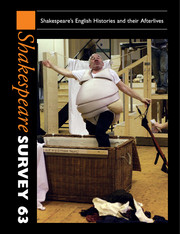Book contents
- Frontmatter
- Shakespeare the Historian
- The Decline of the Chronicle and Shakespeare's History Plays
- Rites of Oblivion in Shakespearian History Plays
- Richard II's Yorkist Editors
- Mapping the Globe: The Cartographic Gaze and Shakespeare's Henry IV Part 1
- Falstaff's Belly: Pathos, Prosthetics and Performance
- ‘And is Old Double Dead?’: Nation and Nostalgia in Henry IV Part 2
- Performing the Conflated Text of Henry IV: The Fortunes of Part Two
- Medley History: The Famous Victories of Henry the Fifth to Henry V
- Georgic Sovereignty in Henry V
- The Troublesome Reign, Richard II, and the Date of King John: A Study in Intertextuality
- The Trials of Queen Katherine in Henry VIII
- ‘Watch Out for Two-handed Swords’: Double-Edged Poetics in Howard Barker's Henry V in Two Parts (1971)
- Daunted at a Woman's Sight?: The Use and Abuse of Female Presence in Performances of the Histories as Cycles
- The RSC's ‘Glorious Moment’ and the Making of Shakespearian History
- Shakespeare as War Memorial: Remembrance and commemoration in the Great War
- Shakespearian Biography, Biblical Allusion and Early Modern Practices of Reading Scripture
- Filling in the ‘Wife-Shaped Void’: The Contemporary Afterlife of Anne Hathaway
- Shakespeare and Machiavelli: A Caveat
- Shame and Reflection in Montaigne and Shakespeare
- Playing the Law for Lawyers: Witnessing, Evidence and the Law of Contract in The Comedy of Errors
- Shakespeare's Narcissus: Omnipresent Love in Venus and Adonis
- Surface Tensions: Ceremony and Shame in Much Ado About Nothing
- ‘Remember Me’: Shylock on the Postwar German Stage
- ‘Dangerous and Rebel Prince’: A Television Adaptation of Hamlet in Late Francoist Spain
- What Shakespeare Did with the Queen's Men's King Leir and When
- Re-cognizing Leontes
- Shakespeare Performances in England 2009
- Professional Shakespeare Productions in the British Isles, January–December 2008
- The Year's Contribution to Shakespeare Studies 1 Critical Studies
- 2 Shakespeare in Performance
- 3 Editions and Textual Studies
- Index to Volume 63
‘Dangerous and Rebel Prince’: A Television Adaptation of Hamlet in Late Francoist Spain
Published online by Cambridge University Press: 28 November 2010
- Frontmatter
- Shakespeare the Historian
- The Decline of the Chronicle and Shakespeare's History Plays
- Rites of Oblivion in Shakespearian History Plays
- Richard II's Yorkist Editors
- Mapping the Globe: The Cartographic Gaze and Shakespeare's Henry IV Part 1
- Falstaff's Belly: Pathos, Prosthetics and Performance
- ‘And is Old Double Dead?’: Nation and Nostalgia in Henry IV Part 2
- Performing the Conflated Text of Henry IV: The Fortunes of Part Two
- Medley History: The Famous Victories of Henry the Fifth to Henry V
- Georgic Sovereignty in Henry V
- The Troublesome Reign, Richard II, and the Date of King John: A Study in Intertextuality
- The Trials of Queen Katherine in Henry VIII
- ‘Watch Out for Two-handed Swords’: Double-Edged Poetics in Howard Barker's Henry V in Two Parts (1971)
- Daunted at a Woman's Sight?: The Use and Abuse of Female Presence in Performances of the Histories as Cycles
- The RSC's ‘Glorious Moment’ and the Making of Shakespearian History
- Shakespeare as War Memorial: Remembrance and commemoration in the Great War
- Shakespearian Biography, Biblical Allusion and Early Modern Practices of Reading Scripture
- Filling in the ‘Wife-Shaped Void’: The Contemporary Afterlife of Anne Hathaway
- Shakespeare and Machiavelli: A Caveat
- Shame and Reflection in Montaigne and Shakespeare
- Playing the Law for Lawyers: Witnessing, Evidence and the Law of Contract in The Comedy of Errors
- Shakespeare's Narcissus: Omnipresent Love in Venus and Adonis
- Surface Tensions: Ceremony and Shame in Much Ado About Nothing
- ‘Remember Me’: Shylock on the Postwar German Stage
- ‘Dangerous and Rebel Prince’: A Television Adaptation of Hamlet in Late Francoist Spain
- What Shakespeare Did with the Queen's Men's King Leir and When
- Re-cognizing Leontes
- Shakespeare Performances in England 2009
- Professional Shakespeare Productions in the British Isles, January–December 2008
- The Year's Contribution to Shakespeare Studies 1 Critical Studies
- 2 Shakespeare in Performance
- 3 Editions and Textual Studies
- Index to Volume 63
Summary
On 23 October 1970, Televisión Española broadcast what had been publicized as one of its important televised theatre productions: Hamlet, directed by Claudio Guerin, and starring Emilio Gutiérrez Caba. Spanish spectators were still living under General Franco's right-wing authoritarian regime, which since the end of the three-year civil war in 1939 had infused the country's cultural life with its fascist-inspired National Catholicism and its repression of dissidence. In such a historical context, a production of Hamlet – a play with an ‘obvious applicability to political practice in dictatorships’ – is bound to raise questions about its relationship with the political tensions of the time: was it appropriated by the dominant ideology (as when in Soviet-type regimes Hamlet was presented as a ‘fighter for social justice, almost a forerunner of socialism’)? did it remain apolitical (also a sort of submission to the authorities’ imperatives), or did it show the prince as a symbol of the intellectual's endurance or political resistance against a totalitarian state (as also common in the Soviet bloc)? How political this 1970 televised Hamlet was has not yet been explored in full. In this essay, I will seek to redress this situation by studying external and internal evidence for its political uses and effects. Comparing them with how political meanings are generated in other Hamlet productions, I will argue that, though not a heavily politicized version, Guerin's Hamlet did have a politically critical charge moulded in its artistic features and responding to its historical circumstances.
- Type
- Chapter
- Information
- Shakespeare Survey , pp. 301 - 315Publisher: Cambridge University PressPrint publication year: 2010

